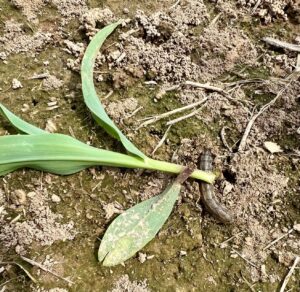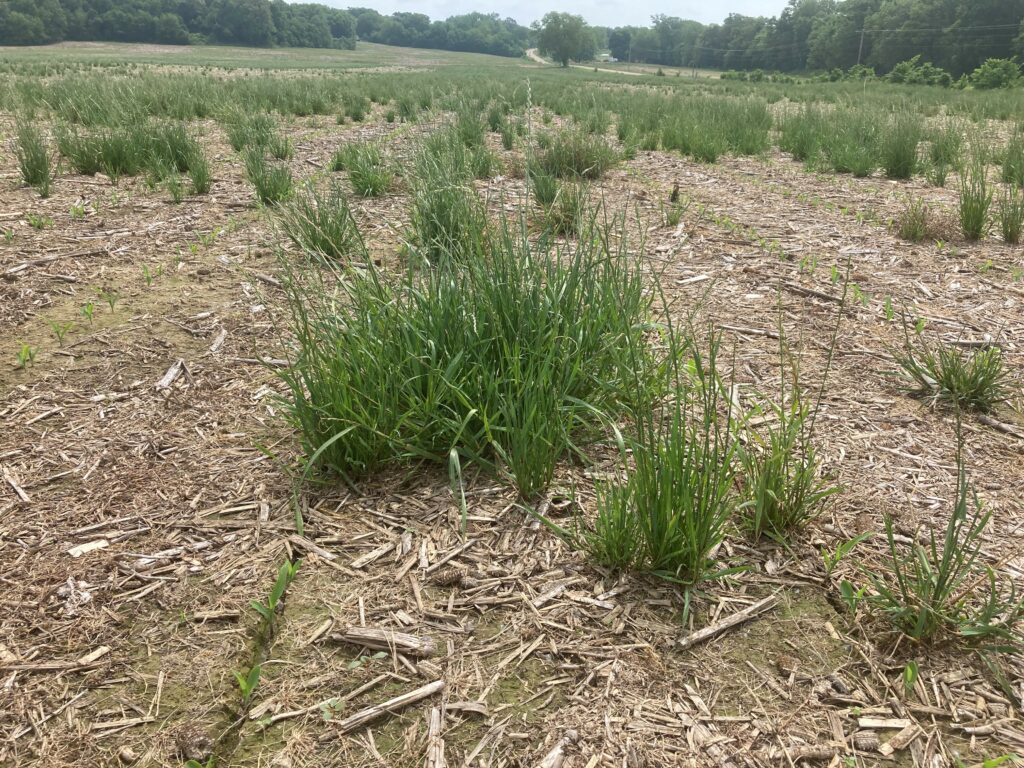As warmer temperatures creep into the forecast each spring, farmers and researchers alike begin to consider just how soon to pull the trigger and put seed into the ground. While these early planting dates may fall slightly outside of what is considered nominal for corn and soybean, certain situations may still provide growers a window of opportunity for early planting. Continue reading
Category Archives: Corn
Breaking the Green Bridge
As general rule, no-till production increases the risks from pests including slugs, cutworm, threecornered alfalfa hopper and several below ground pests such as wireworm and southern corn rootworm. Tillage is not an option in most of Tennessee’s agricultural landscape. This leads entomologists to recommend spring “burndown” applications 4 weeks in advance of planting. The goal is to “break the green bridge” or eliminate alternative hosts (weeds, cover crops) well before planting the cash crop.
However, making burndown applications 4 weeks prior to planting isn’t always possible or it doesn’t align with the goals of having cover crops. One way to help mitigate potential insect issues in late burndown is to add a pyrethroid insecticide with your herbicide application or within 7 days of planting. Beware blooming and pollinator attractive cover crops (vetch, brassica species) may have foraging honey bees and pyrethroids should not be utilized until the plants are not longer attractive to pollinators (desiccated or senescing from herbicides).
Utilizing insecticide seed treatments will offer protection against pest insects that may feed on your cash crop. If you are planting green (not burning down cover crops until after planting) I highly recommend a robust insecticide seed treatment and a pyrethroid insecticide that is included with the burndown herbicide. In corn this would be Poncho 500 or 1250, in soybeans Gaucho or Cruiser treated seed and in cotton Gaucho or Aeris based treatments will offer adequate protection from most below ground and some above ground pests. Keep in mind, seed treatment residual activity is strongly influenced by environmental factors, plant growth and amount of AI on the seed.

Cutworms in corn and cotton are uncommon but can be a serious pest. Pyrethroid applications within a week of planting will significantly reduce the risks of cutworm issues at low cost. Insecticide seed treatments are normally not enough to control cutworms and Bt traits in corn and cotton can offer mixed results depending on the traits. Three gene corn and cotton (those that include the Vip trait) provide better cutworm control than dual gene corn and cotton (V2TP, BG2 etc).
Overall, I like to see farmers planting in grave yard dead fields of weeds or cover crops but that isn’t always the case. Providing protection for your cash crop, at a relatively low expense, may help avoid the painful and costly decision to replant.
Corn Weed Management Options
There are three newer corn herbicide premixes available: Acuron GT, Armezon PRO and Resicore. Below are some thoughts on these newer premixes as well as some that have been around for a spell: Continue reading
It is “Burndown Time in Tennessee.”

The combination of some lingering supply chain issues, most notably Sharpen and Verdict are in tight supply, with the ever-increasing presence of herbicide resistant weeds has made burndown time more of a challenge. On a positive note, glyphosate is in great supply and down in price about 40% compared to last year. Continue reading
New Regulation on Atrazine Public Comment Period Closes October 7.
The Environmental Protection Agency (EPA) has proposed additional mitigations and regulations on the use of atrazine. The open comment period will close this Friday October 7. If you are interested in commenting see this link. I know that it is a very busy time of year but please consider making a comment on this topic. You all are the experts since you steward this herbicide, on many acres, each spring and your comments have more value than many that are sent. Continue reading
EPA Requests Comments on Organophosphate Cancellation Petition
The EPA is soliciting public comment on a petition from several organizations to cancel remaining organophosphate (OP’s) insecticide registrations. OP’s are widely utilized in Tennessee row crop agriculture and are critical components of IPM programs. Cancelling an important crop protection product would place increased pressure on a limited number of control options available to producers. We are encouraging agricultural professionals to comment to the EPA on the impacts OP’s have on your production systems. If you need assistance with comments please contact your UT extension specialist. The link to comment is below. Deadline for comments is August 11, 2022.
Organophosphate registrations Regulations.gov
EPA–HQ–OPP–2022–0490
Bollworm Trap Catches
I’ve gotten a few phone calls inquiring about our bollworm moth trap catches and what the populations are doing. To date, we’ve only had one trap catch that was in the double digits and that was on the WTREC research station. Our trapping runs began in May and will continue through August across West TN. We are still on the early side for bollworms to appear in cotton and once we begin to see consistent numbers across our catches, I’ll update our numbers on the blog. Keep a look out for eggs and kicking up moths as you scout cotton and soybeans. The drought situation and overall poor condition of corn may have an impact on the bollworm generation migrating out of corn, we’ll see the results of that in the coming weeks.
Dry Weather = Fungicide Not A Good Investment
Even with some rain in the forecast, the dry to drought conditions in Tennessee have reduced disease development and hence reduced the potential to break even on a fungicide in corn.

